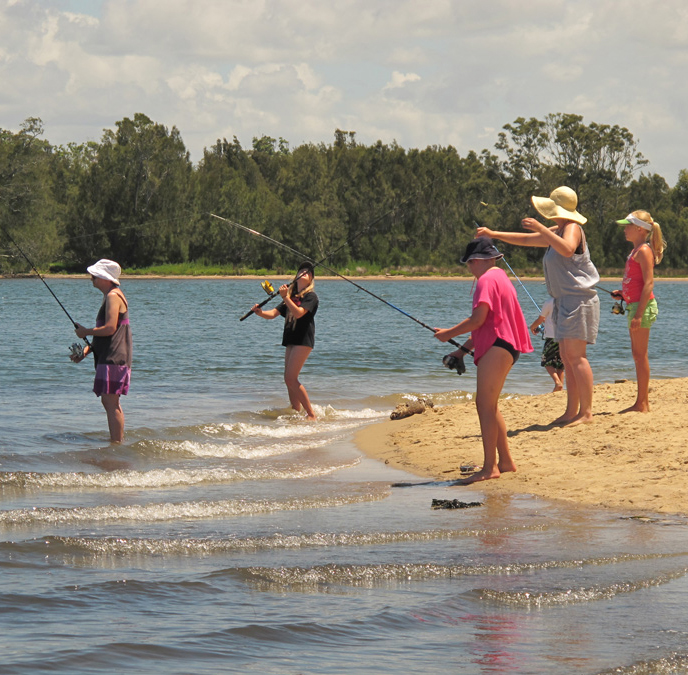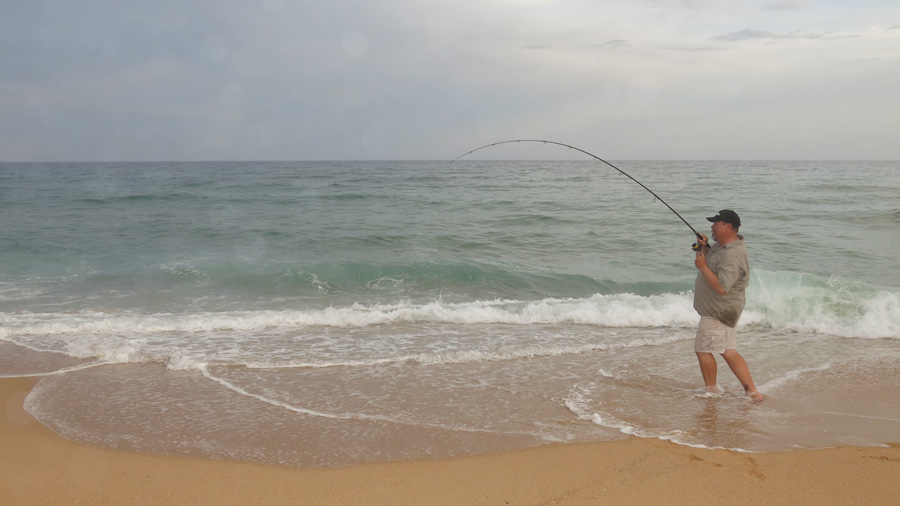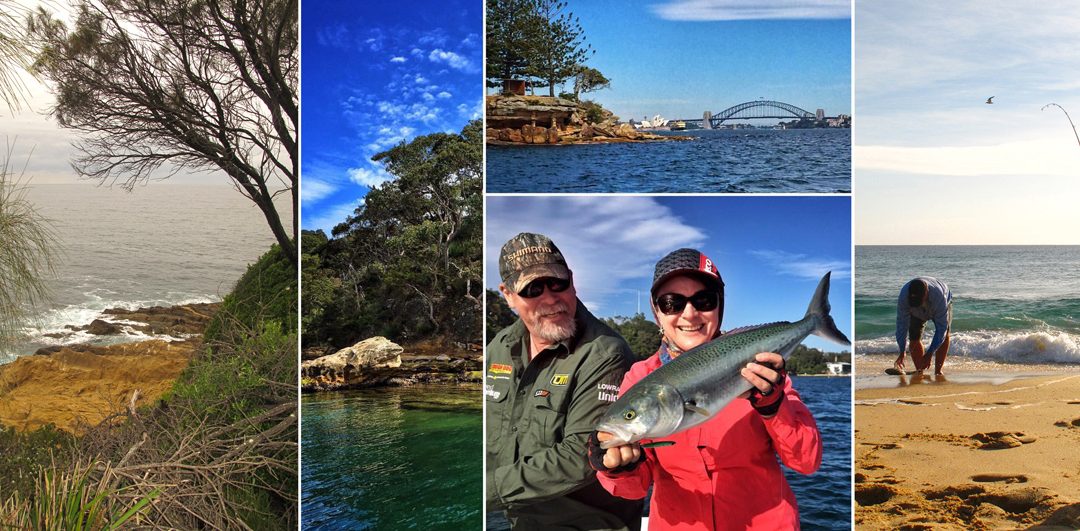Can you imagine an Australia without recreational fishing? Such a dire future might not be beyond the realms of possibility, especially if we continue on our present path. Following a year of heated debate on a number of fishing-related fronts, Jo believes it’s long past time for the non-fishing public to learn the full story about Australia’s recreational fishing industry and it’s immense importance to the nation.

How quintessentially Australian is this scenario?
For many, this is an accurate description of a family cultural tradition and heritage that spans generations. Australia’s coastal communities have long been holiday Meccas for Aussie families from all walks of life, with recreational fishing playing a huge role in the activity menu of each trip. At almost every opportunity—long weekends, school holidays, and even standard summer weekends—holiday accommodation fills and the populations of these small towns temporarily swell. Businesses swing into top gear and the pulse of these communities accelerates. It’s at these times many the towns make their living. A group or family visiting a small coastal community for their fix of relaxation, fun and fishing will bless the bank accounts of an astounding array of local businesses. These are likely to include holiday accommodation, tackle stores, cafes, newsagents, petrol stations, grocery stores, post offices, boat and equipment hire businesses and pubs (you’ve got to do your local research somewhere). The knock-on and multiplier affect of all this spending is significant.


An industry under threat
When you sit back and consider the ebb and flow of Aussie cash in pursuit of our fishy friends, you begin to realise that we are a part of something very big. Australia’s community of recreational anglers need to recognise that they belong to a vibrant and growing industry.
We are an integral part of an economic and social asset that is booming. Yet our pastime is increasingly under threat from authorities, bureaucracies and special interest groups that fail to acknowledge us for what we are: a serious, viable industry. Instead, we’re treated as a bunch of casual tourists and hobbyists who conveniently spend money in their various jurisdictions.
To my despair, this is particularly true in New South Wales. Why aren’t we taken seriously? Because we don’t communicate our needs, desires and demands as a single, united entity. We don’t have a voice. We really need to embrace our role in the fishing industry and stop floating around like isolated hobbyists, each doing our own thing and trusting in the great Aussie tradition of “she’ll be right, mate”. Until we begin advocating, communicating, presenting and behaving like a coherent industry, we will never be perceived and treated like one… regardless of our significance.
Importance versus power
Can you imagine what would happen to the economy if the recreational fishing industry folded? Not just the economies of the myriad small coastal towns so dependent on the fishing tourist dollar (the failure of our industry would render these virtually unviable), but the nation’s economy as a whole? The ABS Year Book Australia 2003 states: “It is estimated that over five million Australians take part in recreational fishing in Australia as a leisure activity. Recreational fishing also supports about 90,000 Australian jobs.” (see footnote 1)
The book goes on to explain that: “Recreational fishing is particularly important from a regional perspective, with significant flow-on benefits, such as providing employment opportunities in the tackle, boating, tourism, fishing charter and associated industries in many coastal and rural areas. Most of Australia’s recreational fishing is undertaken along the coast and estuaries of New South Wales, Queensland and Victoria, reflecting both the excellent fishing areas and the geographic spread of Australia’s population.”


Our expenditure as anglers is not exactly modest, either. According to the Australian National Sportfishing Association, the recreational fishing industry in Australia back in 2001 was worth over $2.9bn per annum. Based on participation figures, it’s likely that over 60 per cent of this expenditure will have been directly related to our estuarine fisheries. That puts the annual spend on recreational fishing in Australian estuaries alone, excluding any flow-on impacts, in the vicinity of $1.7bn… and that was 12 years ago. The figure is certain to have increased significantly since then. (see footnote 2)
An Australian Bureau of Statistics (ABS) report of the number of people engaged in various recreational activities during 1999-2000 revealed that recreational fishing ranked fifth highest in terms of participation rates amongst the 50 activities surveyed (see footnote 3) … Little wonder that debates surrounding rec’ fishing legislation are so often passionate and vigorous, even if those debates aren’t necessarily coherent and well-organised.
With well over a decade having passed since these ABS figures were collated, it’s fair to assume that there are even greater numbers participating in our pastime today. As more and more women like myself pick up the rod and embrace recreational fishing, while also encouraging their kids to do the same, participation rates are growing. Old notions of a male-only angling fraternity are fading (happily) as entire families join the rec’ fishing community. One result is a further loosening of the purse strings when it comes to spending on fishing-related activities.
There’s simply no denying the value of the recreational fishing industry to the Australian economy, as well as to our culture and lifestyle. Our importance is occasionally acknowledged in political and bureaucratic rhetoric, but its true power has been neither recognised nor harnessed.
The big stick
In 2000-01, the NSW government conducted a survey to assess the participation rates and economic value of recreational fishing to the state’s economy. The report asserted that there were one million recreational fishers in NSW at the time, representing approximately 17.1 per cent of the total population. By far the strongest participation rate was on the state’s south coast (my home), where more than 30.1 per cent of the population fished for recreation. The north coast wasn’t far behind, 29.9 per cent. (see footnote 4)
The report also discovered that all of those fishers spent more than $550 million per year on fishing related expenses. That’s a fair pile of pesos pouring into the state’s coffers… and this was 13 years ago!
So, help me out here… I’ve never professed to be a mathematical genius, but it seems glaringly obvious to me that NSW economic well-being would be severely damaged by the loss of our fishing industries, right?
As a relatively recent migrant from the wild barramundi rivers of the Northern Territory, I’ve been frequently gob-smacked by the lack of value applied to recreational fishers down this way. Where I come from, recreational fishing is recognised by those on both sides of the political fence as an immensely valuable asset.
As in Queensland, the mighty barramundi is an enormous tourism drawcard in the Top End, and studies have consistently shown that a free-swimming wild barra is of far greater economic value than a netted and filleted one. In fact, estimates of the direct cost or expenditure for recreational fishers targeting barramundi in Queensland, including travel costs, suggest a value of approximately $51 per recreational fish landed (and often released), compared to around $19 per commercially-killed barra (based on a fish weight of 3 kg). That particular study goes further and estimates the flow-on or multiplier effects to the state and regional economies in Queensland from recreational barramundi fishers to be approximately threefold.
So, according to Rutledge et al. (1990), a single barramundi caught by a recreational fisher could be worth as much as $153 to the economy of Queensland… and that value remains the same even if the fish is returned to the water alive! click to see research



More than the money
Let’s take a step away from the economics for a moment and look instead the social impacts and benefits of recreational fishing to our community: The recreational fishing sector is far more than an employer and cash cow. It’s also an entertainer, a health and well-being facilitator, an educator about nature and conservation, and a promoter of family values.
Surprisingly, there seems to have been very little research done into the health and well-being benefits of recreational fishing, but I was able to find one very interesting report by Prof A. McManus, Dr W. Hunt, J. Storey and J. White entitled “Identifying the health and well-being benefits of recreational fishing”, written in 2011.
Participants in the research indicated that there were several social, physical, mental health and well-being benefits to be gained from recreational fishing, with a particular emphasis on relaxation and stress relief. When asked to further define these benefits, there was a significant focus on familial bonding.
The research report is extensive and fascinating, but too lengthy to paraphrase here. On the issue of mental health, however, it does state the following: “Motivations for recreational fishing vary, however the social aspects plus the ability to relax and unwind remain the main reasons why Australians partake in recreational fishing. Stress is a major factor in most chronic conditions. The health benefits of reductions in stress and anxiety are evident in the literature, however few studies explore the direct link between recreational fishing and chronic condition management and fewer still attempt to quantify these benefits. There is however, ample anecdotal evidence linking recreational fishing to mental health benefits.” (see footnote 7)
The study concludes, “that considerable health and well-being benefits can be gained through involvement in recreational fishing. Encouraging young children, youth, adults and families to fish offers healthful outdoors recreational activity that can be enjoyed throughout life. Benefits were evident for individuals and groups. Recreational fishing also provides significantly benefits to children and youth with behavioural and mental health issues. “The major benefits identified were: youth development; social support; good mental health outcomes; behavioural management; rehabilitation of upper body musculoskeletal injury; and reductions in stress and anxiety. Seniors can also gain significant health benefits by continuing to remain active both physically and mentally through this enjoyable, low cost outdoor pursuit. Intergenerational transfer of knowledge and skills from seniors to younger generations is another major benefit that should be exploited by recreational fishing groups.”


If the researchers are correct, then the continued disregard of the recreational fishing industry as a vital part of the socio-economic fabric of our community will reverberate negatively in more ways than governments and bureaucrats can possibly imagine.
Stewards of the waters
And let’s not forget the well-being of our waterways! As a proud conservationist, I despair at the overt attacks levelled at my tribe by fanatical preservationists who seem to feel that it is their remit to stop us from fishing. Sadly, these people represent themselves as conservationists to the broader public, who don’t seem to understand the difference. Let me articulate it here:
Conservation demands that the environment and its resources should be used and managed in a responsible manner. It requires that the environment be used in a way that is sustainable, ensuring that the natural resources will be used in a manner that will meet the present day needs for the resource without jeopardising the supply of the resource for future generations. Under preservation of the environment, lands and their natural resources should not be consumed by humans and should instead be maintained in their pristine form. Preservationists believe that humans can have access to the land, but they should only utilise it for its natural beauty and inspiration.
Whilst I recognise that I cannot speak for the whole recreational fishing community (and every sector of society has it’s recalcitrants, us included), the actions of rec fishos from around the country clearly demonstrate our culture of conservationism. Organisations such as OzFish Unlimited, Inland Waterways Rejuvenation Association and Fish Habitat Network are all examples of recreational fishers banding together to respond to the cries of the environment and do the heavy lifting to repair and rehabilitate the damage done by industries outside our own.
Fishing Clubs from around the country participate in revegetation projects along river banks and riparian zones… I know, because I do it. And it’s not unique to Australia. In fact, in countries such as the United States and New Zealand, recreational fishers are recognised as the strongest conservationists of all! Check out the cred of international organisations such as Trout Unlimited and LegaSea — you will get the picture. The global rec fishing tribe is a tribe of conservationists.
The Australian public and their representatives in the corridors of power just haven’t recognised it yet. Even more concerning is that the anti-fishing preservationist groups haven’t realised yet, either. Can you imagine the good work that could be done if those groups realised the power of working with such an enormous group of people whose culture and passion depends on the perpetual health and viability of our waterways, their eco-systems and bio-diversity?


One thing that we probably wouldn’t be confronted with is the current threat of angler lock-outs that we’ve had thrust in our faces for consideration in the last month. The proposed Hawkesbury Bio-Region Marine Park has been tabled by the Marine Estate Management Authority and claims to be in response to the TARA (Threats And Risk Assessment) that was completed in 2016. Recreational fishing was listed as a low to moderate risk in some areas and ranked somewhere below #10 on the list of activities that had an impact on the marine environment. It should be noted that whale watching, scuba diving and walking your dog on the beach also make the list.
The TARA rightly identifies that the greatest threat to the marine estate is pollution, both litter and run-off. Until these whole-of-community issues are resolved, the threats against bio-diversity in our marine environment will not go away. Global research has proven time and time again that spatial management (that is, locking anglers out of areas) has no impact — positive or otherwise — on fish stocks. Just as fish do not understand lines on a map, neither does pollution. Both move freely through the water.
The solution lies in effective management, not just of the biomass, but of the environment as well. And that is the responsibility of every Australian… and in particular, the departments and industries responsible for land degradation, urban and rural run-off, sewage and waste.
The proposed Hawkesbury Shelf Bio-Region Marine Park is a lazy attempt, in my opinion, by the NSW Government to shirk the hard work that the TARA demands, and instead point the finger of blame at the recreational fishing community, simply to be seen to be “doing something”. If they were genuine in their commitment to achieve outcomes for the marine estate, they would be proposing management of the genuine and severe threats, such as sewage outflow, storm water drains that pump urban rubbish into the oceans, chemical run-off from industrial and farm lands… and don’t get me started on global warming.
The science exists to prove that the shore-based fishing lock-outs on rocky headlands up and down the coast had no impact on the bio-diversity or the bio-mass surrounding them. That’s why the lock-outs were in 2017. Why, then, are they being proposed again now?
It’s about public perception, not public benefit. It’s evidence of the preservationists putting the ‘con’ in conservation. And all they are doing is disenfranchising an enormous group of habitat heroes and custodians, committed to the conservation and rehabilitation of Australia’s waterways by way of dependance — our lifestyle and culture is intrinsically tied to the health of our fresh and saltwater ecosystems. Healthy habitats, environments, eco-systems and waterways equals more fish. More fish equals better fishing. It’s really that simple.
If decision makers in NSW continue to undermine the recreational fishing industry, they are likely to experience more than a loss in revenue and jobs and the decline of coastal communities. They could also experience spikes in stress-related mental health issues as not only those who lose their livelihoods feel the pressure, but also the many anglers who currently use their fishing as a form of stress relief from their day-to-day lives. The adverse social impacts could well be dramatic.
To the victor the spoils
Sadly, the negative impacts of a continued public ignorance to the social, environmental and economic values of the recreational fishing sector are very real.

As an example, a recent discussion on Facebook posed the question to eastern seaboard-based recreational anglers about the quality of their fishing experiences in NSW over recent years. Several respondents suggested that since Victoria had removed commercial netting from many of its estuaries, the fishing south of the border had surpassed that available in NSW. As a result, some respondents had already switched their regular, holiday fishing destination to Victoria. Clearly, the Victorian government’s decision to nurture recreational fishing assets is already showing significant returns on investment.
Let’s hope that the power brokers in all states (and also the new federal minister) come to recognise the value of recreational fishing to Australia — not only to our economy, but also to our social well-being as a nation. Such recognition needs to be driven directly by us, the individual, avid anglers of Australia. Recognising our own worth and pulling together in defence of our fishing rights is vital to ensure our kids can carry on our traditions.
So, let’s not sit back and believe others will fight our battles, or that “she’ll be right”. Let’s stand up in support of the organisations that carry our concerns to government and advocate with unity and passion. Let’s each and every one of us ensure that the Government hears our call to manage the marine estate effectively and NOT lock out anglers by implementing spatial management practices that are proven not to work. Make your submission to the Hawkesbury Shelf Bio-Region Marine Park discussion here.
This is a personal opinion piece by Jo Starling and in no way seeks to represent any entity or organisation that she represents or is aligned with.
Footnotes

ALL THE LEGAL BITS
ADVERTISE WITH US

